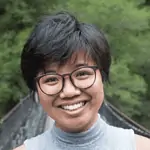Disability Justice & Crip Technoscience: Racism & Ableism in AI & the Future of Technology
AWN hosted a discussion with Damien Patrick Williams and Crystal Lee on disability justice interventions for racism and ableism in AI in April 2021, convened and moderated by AWN’s Director of Public Policy, Advocacy, & External Affairs, Lydia X. Z. Brown.
Artificial intelligence (AI) technologies are ubiquitous, affecting pretrial bail determinations, health care resource allocation, school admissions, credit reporting, hiring, and policing. For disabled people, technology has often both created and enabled greater access and also threatened to sever access while promoting eugenicist ideas about cures. What interventions do Disability Justice and the emergent field of crip technoscience (named first by Aimi Hamraie and Kelly Fritsch) make into conversations about AI and the future of technology? Where does “algorithmic fairness” or “algorithmic bias” fall short in addressing racism and ableism?
Corrected transcript coming soon.
Presenters
Damien Patrick Williams

Damien Patrick Williams is a PhD candidate in the Department of Science, Technology, and Society, at Virginia Tech. Damien researches how the values, knowledge systems, philosophies, social structures, religious beliefs, and lived experiences of humans can affect the creation and use of algorithms, machine intelligence, biotechnological interventions, and other technological systems and artifacts. More on Damien’s research can be found at A Future Worth Thinking About.
Crystal Lee

Crystal Lee is a PhD candidate at MIT and a Fellow at the Berkman Klein Center at Harvard University. She works broadly on topics related to the social and political dimensions of computing, data visualization, and disability. She also conducts ethnographic and computational research on social media communities. Crystal’s research has been supported by the National Science Foundation, Social Science Research Council, and the MIT Programs for the Digital Humanities. Previously, she was a visiting research scientist at the European Commission, and graduated with high honors from Stanford University.
Communication Access Team
- Gino Gouby - ASL interpretation
- Jeremy L. Brunson - ASL interpretation
- Jayne Tubergen - ASL interpretation
- Danielle - CART captioning
